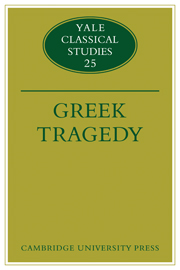Book contents
- Frontmatter
- Contents
- Introduction
- Septem contra Thebas
- The dissembling-speech of Ajax
- The tragic issue in Sophocles' Ajax
- Sophocles' Trachiniae: myth, poetry, and heroic values
- On ‘extra-dramatic’ communication of characters in Euripides
- The infanticide in Euripides' Medea
- The Medea of Euripides
- On the Heraclidae of Euripides
- Euripides' Hippolytus, or virtue rewarded
- Euripides' Heracles
- The first stasimon of Euripides' Electra
- Trojan Women and the Ganymede Ode
- The Rhesus and related matters
Euripides' Heracles
Published online by Cambridge University Press: 10 January 2011
- Frontmatter
- Contents
- Introduction
- Septem contra Thebas
- The dissembling-speech of Ajax
- The tragic issue in Sophocles' Ajax
- Sophocles' Trachiniae: myth, poetry, and heroic values
- On ‘extra-dramatic’ communication of characters in Euripides
- The infanticide in Euripides' Medea
- The Medea of Euripides
- On the Heraclidae of Euripides
- Euripides' Hippolytus, or virtue rewarded
- Euripides' Heracles
- The first stasimon of Euripides' Electra
- Trojan Women and the Ganymede Ode
- The Rhesus and related matters
Summary
The recurrent problem of the Heracles is its apparent lack of unity. It is generally said to fall into either two or three parts, with the episode of Heracles' madness causing a decisive break in the action. While some critics hold that such a lack of cohesion is fatal to the dramatic structure of the play, others maintain that the ruptures constitute the tragedy's main interest. It is not only the play's structure that has been called into question; there is also puzzlement over the dominant theme. J. T. Sheppard looked to the closing lines, and proposed friendship, strength and wealth as motifs of the Heracles. H. H. O. Chalk declares: ‘Arete is the hub of the wheel … Youth, Age and the passage of Time, Tyranny and Wealth … [are] the spokes.’
There seems little doubt that the play falls into three parts, but whether this division bespeaks a lack of unity is another matter.
Moreover, while the aforementioned themes are touched on at various points in the play, none of them is adequate to explain the whole. They are not themes particularly germane to the character of Heracles: references to philia, the futility of wealth, the passage of time turn up in almost any Greek tragedy one cares to examine.
If one hopes to defend the structural and thematic unity of the Heracles it would be helpful to be able to point to some motif that spans all the episodes: a motif, moreover, that is particularly linked to the story of Heracles and that can help to account for the various modifications Euripides has made to the received myth.
- Type
- Chapter
- Information
- Greek Tragedy , pp. 259 - 276Publisher: Cambridge University PressPrint publication year: 1977



